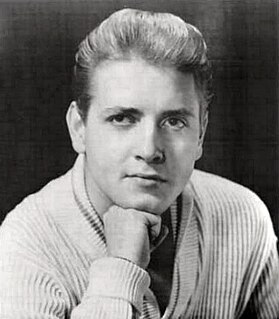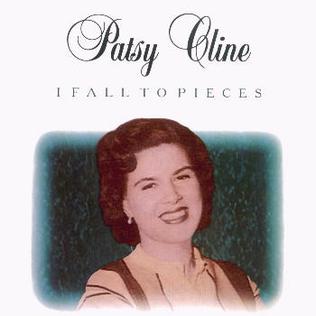
Ray Edward Cochran was an American rock and roll musician. Cochran's songs, such as "Twenty Flight Rock", "Summertime Blues", "C'mon Everybody", and "Somethin' Else", captured teenage frustration and desire in the mid-1950s and early 1960s. He experimented with multitrack recording, distortion techniques, and overdubbing even on his earliest singles. He played the guitar, piano, bass, and drums. His image as a sharply dressed and attractive young man with a rebellious attitude epitomized the stance of the 1950s rocker, and in death he achieved iconic status.

Adventures in Paradise is an American television series created by James Michener and starring Gardner McKay, which ran on ABC from 1959 until 1962.

"Summertime Blues" is a song co-written and recorded by American rock and rockabilly artist Eddie Cochran. It was written by Cochran and his manager Jerry Capehart. Originally a single B-side, it was released in August 1958 and peaked at number 8 on the Billboard Hot 100 on September 29, 1958 and number 18 on the UK Singles Chart. It has been covered by many artists, including being a number-one hit for country music artist Alan Jackson, and scoring notable hits in versions by Blue Cheer, The Who, and Brian Setzer, the last of whom recorded his version for the 1987 film La Bamba, in which he portrayed Cochran. Jimi Hendrix performed it in concert.
"In the Beginning" is a popular song, by Dorcas Cochran, Kay Twomey, Ben Weisman, and Fred Wise. The lyrics commence: "In the Beginning the Lord made the earth...".
"Last Kiss" is a song released by Wayne Cochran in 1961 on the Gala label. It failed to do well on the charts. Cochran subsequently re-recorded his song for the King label in 1963. It was later revived by J. Frank Wilson and the Cavaliers, Pearl Jam and several international artists, including the Canadian group Wednesday, with varying degrees of success. The song was one of several teen tragedy songs from that period. The song's opening lyrics mirror the opening lyrics of Septimus Winner's "Der Deitcher's Dog".
"I Get Ideas" is a popular song.

"I Fall to Pieces" is a song written by Hank Cochran and Harlan Howard that was originally recorded by Patsy Cline. Released as a single in 1961 via Decca Records, it topped the country charts, crossed over onto the pop charts and became among Cline's biggest hits. Cline was initially reluctant to recording "I Fall to Pieces" and believed its production lacked enough country instrumentation for her liking. Eventually, Cline recorded the song upon the encouragement of her producer.
"Make the World Go Away'" is a country pop song composed by Hank Cochran. It has become a Top 40 popular success three times: for Timi Yuro, for Eddy Arnold (1965), and for the brother-sister duo Donny and Marie Osmond (1975). The original version of the song was recorded by Ray Price during 1963. It has remained a country crooner standard ever since.
"Am I Blue?" is a song copyrighted by Harry Akst (music) and Grant Clarke (lyrics) in 1929 and then featured in four films that year, most notably with Ethel Waters in the movie On with the Show. It has appeared in 42 movies, most recently Funny Lady and The Cotton Club, and has become a standard covered by numerous artists.
"What If I Said" is a song written and performed by American country music artist Anita Cochran as a duet with Steve Wariner. The single was released in November 1997 as was Cochran's only No. 1 single on the U.S. Billboard Hot Country Singles & Tracks chart, as well as her only Top 40 single on that chart. In addition, the song was Wariner's first chart entry in three years, as well as his first No. 1 since 1989's "I Got Dreams." The song was nominated by the Country Music Association for Vocal Duet of the Year in 1998.
"That's My Desire" is a 1931 popular song with music by Helmy Kresa and lyrics by Carroll Loveday.
"Hallelujah I Love Her So" is a single by American musician Ray Charles. The rhythm and blues song was written and released by Charles in 1956 on the Atlantic label, and in 1957 it was included on his self-titled debut LP, also released on Atlantic. The song peaked at number five on the Billboard R&B chart. It is loosely based on 'Get It Over Baby' by Ike Turner (1953).
Here is an adverb that means "in, on, or at this place". It may also refer to:
"Crazy Arms" is an American country song which was a career-making hit for Ray Price. The song, released in May 1956, went on to become a number 1 country hit that year, establishing Price's sound, and redefining honky-tonk music. It was Price's first No. 1 hit.
Dorcas Cochran was an American lyricist and screenwriter. She is also referenced by her married name, Dorcas Cochran Jewell.
"Under the Bridges of Paris" is a 1913 popular song with music written by Vincent Scotto, the original French lyrics by Jean Rodor (1913), and English sections of lyrics added by Dorcas Cochran (1952) resulting in the released version (1954) containing both French and English sections.
"Is It Raining at Your House" is a song co-written and recorded by American country music artist Vern Gosdin. It was released in December 1990 as the second single from his compilation album 10 Years of Greatest Hits, but originally appeared on his 1987 album Chiseled in Stone. The song reached number 10 on the Billboard Hot Country Singles & Tracks chart; it was Gosdin's last top-10 hit on the country charts. Gosdin wrote the song with Dean Dillon and Hank Cochran.

"Weekend" is a song recorded by Eddie Cochran. The song was written by Bill and Doree Post and recorded in April 1959.
"Sittin' in the Balcony" is a song written and performed by John D. Loudermilk under his artist name Johnny Dee. It was released in January 1957 on the Colonial Records label. Eddie Cochran had a Top 40 hit in the U.S. with his recording on Liberty Records in 1957.
"I Cry" is a song written by Tia Sillers and Mark Selby, and recorded by American country music artist Tammy Cochran. It was released in November 2001 as the fourth single from the album Tammy Cochran. The song reached number 18 on the Billboard Hot Country Singles & Tracks chart.




